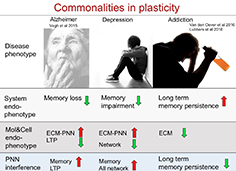
Sabine Spijker receives 1.5 M€ for her research on depression. ‘This Vici grant allows me discover what is the limit in information processing that is apparent in ‘the prison of depression’.
A prison for the mind: Limiting neuronal plasticity involving the extracellular matrix

Currently, we know that specific sugar-containing protein structures that enwrap nerve cells in the brain, named the extracellular matrix are able to modulate neuronal plasticity. This is to ensure that our brain can stick onto information over many years, without intermediate change. The counter side of this is that the matrix may also aberrantly limit plasticity under disease conditions.

“I discovered various exciting examples of this already in the past few years in various psychiatric models. In the model of depression that I use these matrix structures are increased, debilitating proper information exchange, and hence impair cognitive function typical for depression. My aim is to generate new insights into the matrix-mediated mechanisms that govern limitations in plasticity underlying cognitive function. This knowledge will potentially enable translation into early prevention or treatment strategies of mental disorders in which the ECM plays a role. As the matrix may act restrictive in various diseases, like neurodegenerative diseases, I think my research will provide new insight into other disease areas as well.”